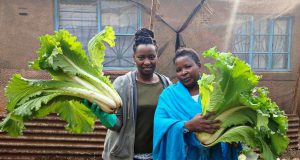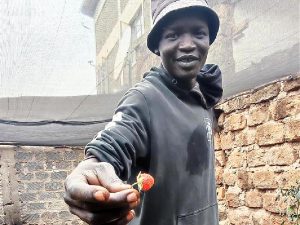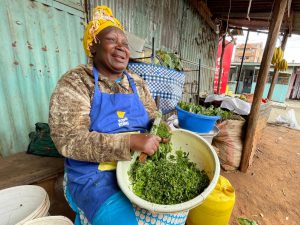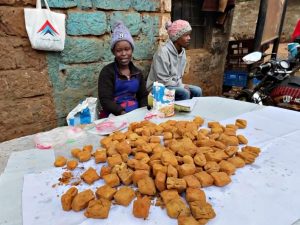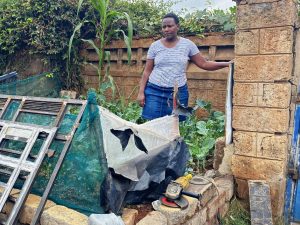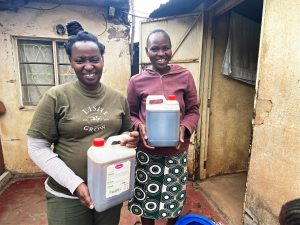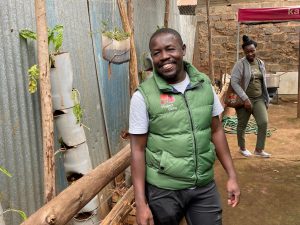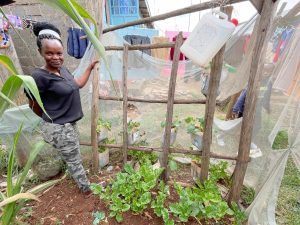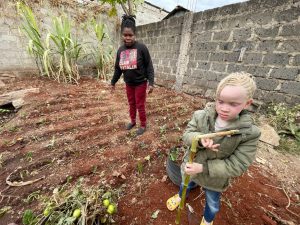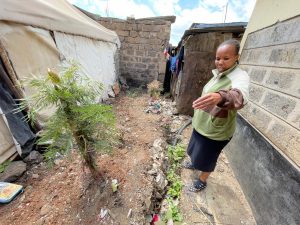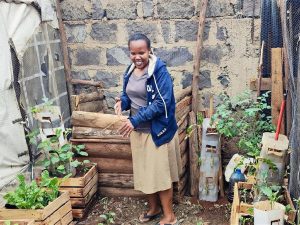ADVOCACYNET 403, March 8, 2024
The Greening of Kibera
Second of two articles by Iain Guest
If Shield of Faith’s first goal is to curb pollution, improving nutrition comes a close second.
Most vegetables sold in Kibera are grown in sewage. This has led to under-nutrition and stunting among children. Added to which, food is so expensive that it can account for a third of a family’s weekly bills.
Stella Makena, the group coordinator, has long dreamed of producing organic food in Kibera. This seems far-fetched given that very few families in the settlements have a back yard, let alone access to cultivable land. Yet twelve of the 20 composters erected kitchen gardens and grew their own food in 2023.
The gardens themselves are miracles of innovation, fashioned from recycled wood and old plastic containers into which are added soil, seeds and Lishe-Grow leachate produced by the worms. Some composters have also begun to grow vegetables in vertical plastic towers, which can be taken apart and are fed with water from the top. The towers are perfect for a confined space.
Most of the gardeners grow collard greens, known locally as sukuma wiki, which is sturdy and nutritious. Kale, cabbage, strawberries, lettuce, cucumbers, maize, tomatoes, onions and pumpkins have also graced their gardens. Some varieties can last up to 4 months before they are exhausted and need to be replaced with new seedlings or cuttings. The discarded plants are composted.
Stella is the group’s green guru and she visits her gardeners regularly to offer advice and encouragement. Water and soil pose the biggest challenges. One enthusiastic gardener, Roseanne, keeps chickens which provide her garden with manure. But when we visited, the soil in her plastic towers was drying out too quickly and causing her vegetables to wither. Stella recommended adding worm castings and compost.
Gardens are treated like members of the family. Beldine has covered her plants with a blanket of recycled netting to protect them from the sun and heavy rains. Stella’s verdict: “Beldine – you’re a star!”
So much effort, but does it produce any food worth speaking of? I put the question to Stella while nose high with some drooping sukuma wiki in another garden. Not to worry, she said, the plants would perk up after being watered. Vena, the owner of the garden, told us that she harvests vegetables three times a week and makes each batch last for several meals. In addition to the nutritional benefits, Vena saves money on food bills.
All of which was music to Stella’s ears. The idea of growing organic food in the middle of such an unhealthy environment appeals to her deeply.
*
The Kibera composters understand that on their own they will have a negligible impact on a settlement of over 200,000 souls that generates around 230 tons of garbage a day. As a result, they hope to take their model out into the community and become, in Stella’s words, “catalysts for change.”
One point of entry could be public schools, which offer a daily cooked meal to students and in the process generate prodigious amounts of organic waste. Once composting catches on in one school, predicts Stella, others will follow.
Stella took a step in this direction last year when she and Vena erected a kitchen garden at Project Elimu, a well-known after school program that offers ballet and art to over 200 children from Kibera schools at weekends and many more during the holidays.
The children are happy to get into the dirt and Michael Wamaya, the visionary founder of Elimu, was delighted to add gardening to the curriculum.
“Kibera is very rough on children,” he told me. “But when we show them how tomatoes grow, they want to water the plants. This brings out a kindness in them and affects the way they deal with other children.” One of Michael’s top students, Felix, has agreed to serve as a Shield of Faith “green ambassador.”
*
Under Stella’s 2024 plan, ten composters will collect organic waste from their neighbors and create “composting hubs.” This, she hopes, will build interest and start creating demand for composting in the community at large.
The creative chaos of settlement life will help. Outside the Elimu center, the streets are alive with vendors selling fruit, vegetables and cooked snacks like kangumu (crunchy cakes) or mandazi (a local donut). Some variety of food is found at every corner and most of it generates organic waste that could be composted.
Some hubs are already under way. Eunice collects waste from her neighbors to feed her large garden, which is an island of green in a sea of gray grime. Several other Shield of Faith members use her garden to plant and harvest their own vegetables.
At first sight, hubs are beyond the reach of composters like Catherine and her son Biden (named after the US president), whose rooftop garden was demolished when their landlord added a new level to the building. Ruth is another composter who lives several floors up and has no back yard.
But Ruth is determined to grow her own food and she has persuaded the local authority to lease her a tiny strip of waste-land a considerable distance from her building. The land was littered with rubbish when we visited but the prospect of going green was already putting a smile on Ruth’s face.
Sure enough, after several weeks of hard work, the ubiquitous sukuma wiki was sprouting in Ruth’s garden and a new composting hub had been born. Stella’s before and after photos (below) say it all.
Iain Guest is Director of The Advocacy Project. Read the first article in this series

